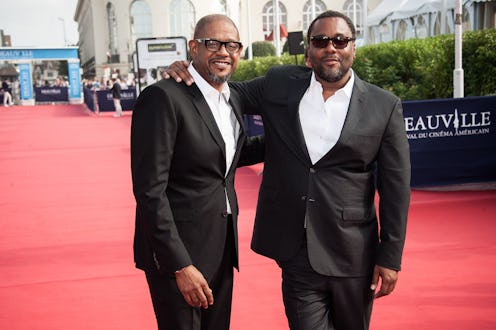Entertainment
What Does A 'Milestone Year' In Black Film Mean?
Is it the power of Oprah, or something (somehow) bigger? Lee Daniels' The Butler now has a place in black cinematic history — it's the first "black film" directed by a black filmmaker to make over $100 million at the box office. Like much of the news surrounding the success of black media, it is both triumphant and startling. It highlights how far we've come, while also pointing out how far we haven't.
This year is a big one for black people in cinema. Chiwetel Ejiofor is wowing just about everybody who's been in the vicinity of 12 Years a Slave — as is director Steve McQueen. Michael B. Jordan's dropped some jaws in Fruitvale Station and is also raking in some Oscar buzz. Same goes for Idris Elba in Mandela: Long Walk to Freedom.
It's a year with a relative abundance of celebration for the contributions of the black community (however you define that) to the filmmaking canon, and the talent therein very much deserves to be celebrated and lauded — and they deserve the opportunity to break these box office records and rake in these awards at a much higher rate than they've been "allowed" to.
Indiewire had something interesting to say on the matter of The Butler 's recent successes:
Part of the reason for that is that, within the studio system, black directors just haven’t always been given the opportunity to direct “black films” – especially those that did gross over $100 million in recent years, like Django Unchained, Dreamgirls, The Pursuit Of Happyness, and even Big Mommas House, which all grossed over $100 million, in their years of release, un-adjusted for inflation.
I took a black cinema course in college — and yes I know, blah blah liberal arts degree, entitled whining, etc. — but one of the biggest things that I took away from that course was one super depressing realization: Black cinema is trapped. Whether it's the poverty of Precious, the atrocities witnessed in 12 Years a Slave, or the more recently occurring tragedy depicted in Fruitvale Station, when it comes to awards recognition, the assorted academies are no stranger to fawning over historical and/or "grittily realistic" depictions of the black struggle.
So, then, one giant aspect of the "struggle" of black filmmaking is precisely that aspect: It's important to depict the historical issues — but it's also important to, excuse my phrasing, diversify. Diversify the types of directors who get the opportunity to direct huge films, diversify which of those films with black directors or casts we pay attention to, and diversify what we define as being "the black experience." Because when it comes to America's history, that experience is distinct in a lot of important ways — but that doesn't mean that it has to be wholly separate.
Because lemme tell you, I appreciate a good Civil Rights story like any good black girl — but Civil Rights and poverty and violence are not the only things that I think about. It is all very important, but I do have other things on my mind from time to time.
We have no influence in those aforementioned various awards academies, but what we can do is influence the box office — and that's part of why The Butler's success in raking in the dough is kind of a huge deal. Because it most definitely falls into the category of "sweeping film depicting the history of racism," but maybe (just maybe) it will mean that one or two more black directors gets the chance to get their story told in this next year.
As one particularly thoughtful Tumblr post put it, "until [that happens], however, let’s raise a glass to this year’s class of outstanding performers, because maybe, just maybe their success in this year’s awards rat race will jostle the shamefully whitewashed powers that be within the industry."
So yes, we should 100 percent celebrate the work of the Chiwetel Ejiofors and Michael B. Jordans of the world. We should also continue to shine a light on the black experience and the atrocities the black community has been put through.
You know what else we should do? We should make that Fantastic Four reboot that Michael B. Jordan's set to star in break some damn records during its box office opening weekend. A black man playing a formerly white character is just what we need. Not all black male characters have to be thugs or saints.
